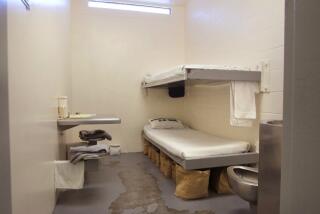Coroner, Eye Bank Cleared in Cornea Suit
- Share via
A Superior Court jury ruled Thursday that the county coroner and the Doheny Eye and Tissue Bank followed the law when they took a 17-year-old suicide victim’s corneas without asking his parents.
But even as the verdicts were being recorded in the closely watched case, jurors issued a rare statement asking officials to change their cornea harvesting practices to be more sensitive to relatives of the dead.
The family of Richard Baltierra Jr., who shot himself to death a month before his 18th birthday, had sought damages of $1 million from the county and the Doheny Eye and Tissue Bank.
Alleging infliction of emotional distress, attorney Joel Warren said the defendants were negligent in taking the corneas without considering the family’s wishes. The eye bank and the county said they were authorized to take the tissue under a section of the state government code known as the coroner’s law.
Jurors took less than five hours to return an 11-1 verdict in favor of the defendants.
Still, the jurors indicated that they were troubled by the law and the way the coroner’s office and eye bank applied it. Standing in the box after the verdicts were read, juror Steven Chan, an engineer from South Pasadena, read this message:
“We the jury, having reached a verdict in favor of the defendants, did have concern with how the Los Angeles County coroner utilized the California government code for legislative consent in the harvesting of corneas. We ask that the Los Angeles County coroner reexamine how they utilize the law, with emphasis placed on the deceased family’s feelings and sentiments toward organ removal.”
The county and the tissue bank said they had followed the law and had done nothing unethical or immoral. Attorney Robert L. Dickson said a 1984 state law gave the defendants the authority to remove the corneas--clear, contact lens-size layers of tissue over the eyes.
But after the verdicts were read, he told jurors the policy changes they requested had already occurred.
The boy’s father, Richard Baltierra, said he was saddened by the verdict, but added: “It was never about the money. We wanted some changes to come about, to give the families the choice, the chance to say yea or nay.”
His wife, Sandy, added: “It was a step forward, the fact they changed this policy. I’m really happy.”
Several jurors indicated that they might contact elected officials, urging them to change the law. A bill is already working its way through committee in Sacramento. The bill, sponsored by state Sen. Richard G. Polanco (D-Los Angeles), would amend the state government code to require the coroner or medical examiner to receive written or recorded permission from a family member before releasing the corneas.
Despondent over a romantic breakup and for failing to finish high school, Richard Baltierra Jr. shot himself in the chest in his family’s Valinda home July 22, 1996. His 11-year-old sister found the body.
The father testified that he told a coroner’s investigator that he didn’t want his son “cut up like a piece of meat.” He told jurors, “I believe that when we leave this world, we should leave whole.”
Baltierra first learned that his son’s corneas had been taken when he picked up an autopsy report about two weeks after the death. He had wondered whether drugs or alcohol had caused his son to take his own life.
Although the report showed no signs of intoxicants, a notation indicating that the corneas had been taken, “put me over the edge,” the father testified.
Several witnesses testified that the law was enacted during a severe shortage of corneas, now the most commonly transplanted tissue. There no longer is any shortage, according to testimony.
More to Read
Sign up for Essential California
The most important California stories and recommendations in your inbox every morning.
You may occasionally receive promotional content from the Los Angeles Times.













